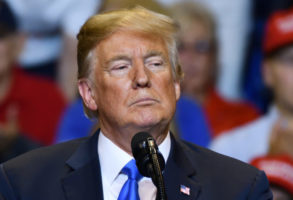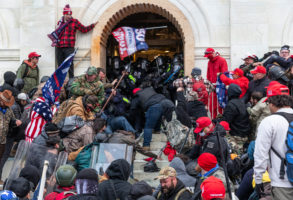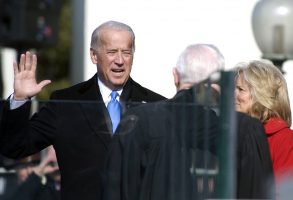Judy Woodruff:
As the sun sets on President Trump’s final full day in office, a new “PBS NewsHour”/NPR/Marist poll shows that he leaves with just 38 percent of Americans approving of his presidency, while 57 percent disapprove of his job performance, nearly a record.
Even today, President Trump remains defiant.
In his prerecorded farewell address, he touted the successes of his presidency and deplored the attack on the Capitol two weeks ago.
January 19, 2021 | PBS NewsHour
On January 19, 2021, EPPC Senior Fellow Peter Wehner appeared on PBS NewsHour to offer a look back at President Trump’s time in office and to discuss his likely legacy.
Click here or below to watch and to access a transcript of the appearance:
Transcript via PBS NewsHour:
Pres. Donald Trump:
All Americans were horrified by the assault on our Capitol. Political violence is an attack on everything we cherish as Americans. It can never be tolerated.
Now more than ever, we must unify around our shared values and rise above the partisan rancor, and forge our common destiny.
Now, as I prepare to hand power over to a new administration at noon on Wednesday, I want you to know that the movement we started is only just beginning.
There’s never been anything like it. The belief that a nation must serve its citizens will not dwindle, but instead only grow stronger by the day.
Judy Woodruff:
For a bigger look at Mr. Trump’s four years in the White House, we turn to Peter Wehner. He is a senior fellow at the Ethics and Public Policy Center in Washington and a contributing opinion writer for The New York Times. He also served in the last three Republican administrations, Presidents Reagan and both Presidents Bush.
Peter Wehner, thank you very much for being with us and for joining us again on the “NewsHour.”
We’re hearing President Trump go out of office saying it’s been a big success, deploring what happened at the Capitol two weeks ago. What is the legacy he’s leaving?
Peter Wehner:
Well, thanks for having me on, Judy.
I think the legacy is carnage and death and a lot of ruin, and it hasn’t been a success. I think it’s been, almost across the board, a failure. I think that he’s probably earned the appellation of the worst president in our history.
And I must say, to hear him condemn political violence, after he incited political violence on January 6 and unleashed an insurrectionist mob on the Capitol, I think that is — I mean, that breached a line that no president has ever breached before.
And I think it’s going to leave a searing impression on the moral imagination of the public. And I think it was a kind of capstone to the Trump presidency. There was almost an inevitability to it ending this way, or something like this.
Judy Woodruff:
In fact, you wrote a column almost exactly four years today, wherein, among other things, you said: “He’s unlikely to be contained by norms and customs or even by laws and the Constitution.”
How did that bear itself out?
Peter Wehner:
Oh, I think it bore itself out almost every day in some way. It certainly bore itself out in the impeachment.
He was a lawless president. And he violated norms in every single direction, civic and political. There was a savagery to our politics because of him. He was a battering ram against reality and against our institutions.
And he’s left our nation riven, basically broken up into warring political tribes. And I will say that, when I wrote that, it was one of the easier things to see. He was a person who so — he was so easy to read. This was a person with sociopathic tendencies.
And I just think a lot of people, particularly people in the Republican Party, which I have been a part of my entire political life — and, as you said, I served in three Republican administrations — but the degree to which Republicans were blind to him and to his maliciousness and his malignancy, either willfully blind or simply blind, I think it’s going to leave a crimson stain on the party.
Certainly, there’s a crimson stain on the Trump legacy.
Judy Woodruff:
You are very much, Pete Wehner, a conservative. You were telling us today you agree with many of his appointments to the federal courts, economic policy, some of his foreign policy.
You’re giving him credit for some of the policy and — the changes he made in policy and the law.
Peter Wehner:
Yes, in some areas.
I don’t think his record is anything like his supporters insist on, but I would say that his judicial appointments — I am a conservative, judicial philosophy. And I think the Federalist Society basically chose his appointments, both at the Supreme Court level and the federal levels. And I think they were really good.
And people I trust in the business world felt like his deregulation policies were successful. I agreed with him when he moved the embassy from Tel Aviv to Jerusalem. And I — there was some progress in the Middle East as it relates to Israel and Arab countries. And Israel was recognized.
Even, I would say, Operation Warp Speed, in terms of vaccinations, I — it obviously wasn’t Trump himself, but Francis Collins is one of the brilliant medical and scientific minds in the world and a wonderful human being. And NIH oversaw that, along with these pharmaceutical companies. There was some success there.
I will say, on that last point, though, it’s just overwhelmed by the mishandling, the epic mishandling by Trump and his administration in every other area on the pandemic, as you just reported earlier, 400,000 deaths, by the end of February, probably half-a-million.
Maybe half of those deaths were unnecessary because of the way that Trump handled it. That is an extraordinary human carnage. And it didn’t have to be this way.
Judy Woodruff:
And interesting you should use the word carnage, because President Trump, in his inaugural address, spoke of American carnage, how he viewed the country as he was preparing to take over as president.
What do you think he will be most remembered for? Do you think it’s the pandemic and, in the final days, this attack on the U.S. Capitol?
Peter Wehner:
I think so.
I mean, I think the Capitol will be the single incident that people remember, because, as I said earlier, it was the kind of capstone to his presidency. There was nothing unexpected about that. And he was a person who, after all, egged them on, incited them, I think.
I think, just in terms of a single policy, it would have to be the pandemic. No president could have escaped unscathed, no country could have escaped unscathed because of this pandemic. Every country has lost lives.
But, again, I think he just so epically mishandled it with — in so many ways, attacking his scientists, the attacks on masks and social distancing, the hydroxychloroquine insanity.
I think, beyond that, Judy, I just wanted to say one other thing. And this, I think, is something that’s going to be with us for a long, long time. And that is that we’re in a kind of epistemic crisis, by which I mean that there has been an assault on truth and reality that Trump has led and his party was a part of and his base was a part of.
And we now live in a world in which we just don’t have policy difference. People are living in different moral universes, different epistemological universes. We don’t have a common set of facts, even a common reality.
And when you lose that, it’s very, very difficult to put it back together again. But if you don’t put it back together again, a free country can’t continue. Ultimately, your politics breaks down and your society breaks down, because there’s no common ground, no ability to persuade other people, no ability to have dialogue.
Trump did that with his conspiracy theories. So, it wasn’t just the lies. It was this intentional assault on reality, which not only spreads lies, but creates a kind of disorientation in the public that has tremendously damaging and long-term effects. And I worry about that.
And what — Joe Biden’s got a lot of tasks before him, but trying to figure out how to put that back together or help put that back together seems to me to be high on the list.
Judy Woodruff:
Pete Wehner, looking back and looking ahead, thank you.
Peter Wehner:
Thanks a lot. Thanks for having me, Judy.








